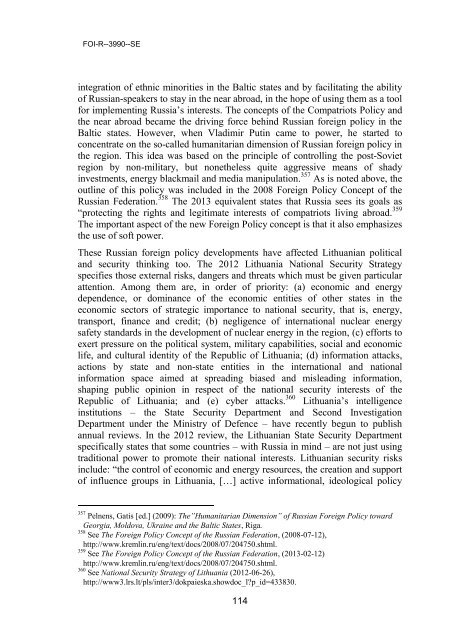FOI-R--3990--SE_reducerad
FOI-R--3990--SE_reducerad
FOI-R--3990--SE_reducerad
Create successful ePaper yourself
Turn your PDF publications into a flip-book with our unique Google optimized e-Paper software.
<strong>FOI</strong>-R--<strong>3990</strong>--<strong>SE</strong><br />
integration of ethnic minorities in the Baltic states and by facilitating the ability<br />
of Russian-speakers to stay in the near abroad, in the hope of using them as a tool<br />
for implementing Russia’s interests. The concepts of the Compatriots Policy and<br />
the near abroad became the driving force behind Russian foreign policy in the<br />
Baltic states. However, when Vladimir Putin came to power, he started to<br />
concentrate on the so-called humanitarian dimension of Russian foreign policy in<br />
the region. This idea was based on the principle of controlling the post-Soviet<br />
region by non-military, but nonetheless quite aggressive means of shady<br />
investments, energy blackmail and media manipulation. 357 As is noted above, the<br />
outline of this policy was included in the 2008 Foreign Policy Concept of the<br />
Russian Federation. 358 The 2013 equivalent states that Russia sees its goals as<br />
“protecting the rights and legitimate interests of compatriots living abroad. 359<br />
The important aspect of the new Foreign Policy concept is that it also emphasizes<br />
the use of soft power.<br />
These Russian foreign policy developments have affected Lithuanian political<br />
and security thinking too. The 2012 Lithuania National Security Strategy<br />
specifies those external risks, dangers and threats which must be given particular<br />
attention. Among them are, in order of priority: (a) economic and energy<br />
dependence, or dominance of the economic entities of other states in the<br />
economic sectors of strategic importance to national security, that is, energy,<br />
transport, finance and credit; (b) negligence of international nuclear energy<br />
safety standards in the development of nuclear energy in the region, (c) efforts to<br />
exert pressure on the political system, military capabilities, social and economic<br />
life, and cultural identity of the Republic of Lithuania; (d) information attacks,<br />
actions by state and non-state entities in the international and national<br />
information space aimed at spreading biased and misleading information,<br />
shaping public opinion in respect of the national security interests of the<br />
Republic of Lithuania; and (e) cyber attacks. 360 Lithuania’s intelligence<br />
institutions – the State Security Department and Second Investigation<br />
Department under the Ministry of Defence – have recently begun to publish<br />
annual reviews. In the 2012 review, the Lithuanian State Security Department<br />
specifically states that some countries – with Russia in mind – are not just using<br />
traditional power to promote their national interests. Lithuanian security risks<br />
include: “the control of economic and energy resources, the creation and support<br />
of influence groups in Lithuania, […] active informational, ideological policy<br />
357 Pelnens, Gatis [ed.] (2009): The”Humanitarian Dimension” of Russian Foreign Policy toward<br />
Georgia, Moldova, Ukraine and the Baltic States, Riga.<br />
358 See The Foreign Policy Concept of the Russian Federation, (2008-07-12),<br />
http://www.kremlin.ru/eng/text/docs/2008/07/204750.shtml.<br />
359 See The Foreign Policy Concept of the Russian Federation, (2013-02-12)<br />
http://www.kremlin.ru/eng/text/docs/2008/07/204750.shtml.<br />
360 See National Security Strategy of Lithuania (2012-06-26),<br />
http://www3.lrs.lt/pls/inter3/dokpaieska.showdoc_lp_id=433830.<br />
114


